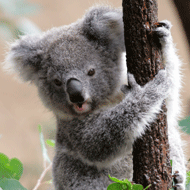Breakthrough in koala chlamydia treatment

As specialised eucalyptus herbivores, koalas are notoriously poor to respond to antibiotic therapy because of their unique metabolism.
Microbiologist Dr Willa Huston from the University of Technology Sydney has identified a chemical that could lead to a new antibiotic treatment for chlamydia in koalas.
Extensive testing of tissue samples has unveiled a chemical compound that is low in toxicity yet highly successful in killing the bacteria. With chlamydial disease affecting as many as nine in 10 koalas in some areas, populations are now listed as ‘vulnerable’ in NSW and Queensland.
Currently, specialist koala vets use Baytril and Chloramphenicol 150 to treat the disease. However, with supplies of Chloramphenicol 150 being removed from the market, and variable success rates with current therapies, the new compound could be a crucial breakthrough.
Dr Willa Huston said: “It’s really urgent that we put a concerted effort into developing this treatment further.”
Koalas are affected by two strains of chlamydia, C. pecorum causing eye disease or urogenital disease and infertility, and C. pneumonia causing severe respiratory illness. As specialised eucalyptus herbivores, koalas are notoriously poor to respond to antibiotic therapy because of their unique metabolism.
“We are in a desperate search to find new, effective treatments and test other drugs that might help koalas recover from this horrible disease”.
Dr Huston and her team are now refining the chemical make up before advancing to testing on diseased koalas.
“Time is running out. We all treasure our koalas and we need to do everything we can to cure this disease.”



 The BSAVA has opened submissions for the BSAVA Clinical Research Abstracts 2026.
The BSAVA has opened submissions for the BSAVA Clinical Research Abstracts 2026.